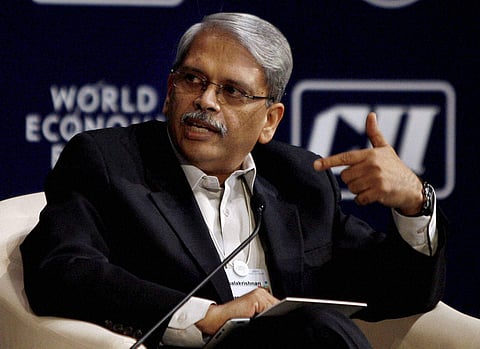

As the world faces an economic downturn that is being dubbed as the worst since the Great Depression, Chairman of Axilor Ventures and Co-founder of Infosys, Kris Gopalakrishnan said that India's Information and Technology (IT) sector will emerge the strongest from this crisis. Kris also pointed out that even though there will be an inevitable blip, it will be temporary and the IT sector will bounce back "stronger than other sectors". He was discussing the economic revival of India and how a post-COVID world would be like with author and journalist, Shankkar Aiyar on The New Indian Express' webinar, Expressions.
Explaining how the IT sector will respond, he said that both IT and ITES will get impacted because their clients will be impacted, but also added that their relationship with their clients is strong and the sector will emerge booming. "They work with the top 2000 companies in the world and every one of them is facing a decline in revenues. Especially in the area of travel and hospitality and that will get transmitted to the IT sector and they will see a decline in revenues," said Kris. 'But what I have experienced during the financial crisis of 2008 is that the best thing about their relationship (with their clients) is that it is very sticky — the customers are very loyal. When things start picking up (pace), you will see the revenues going up for these companies who are zero debt companies and have huge cash balances. they will be able to manage this downturn much better than, I believe, any other industry. They have loyal clients with deep pockets and the leadership is also very experienced in managing crisis," he added.
Gopalakrishnan said that he firmly believes that we might have multiple occurrences of the virus now that we are allowing people to move - but it is the only way forward to rebuild the economy. "Some transmission will happen and we need to prepare ourselves for that and go forward with this. I am optimistic that we will put this behind and we will restart the economy. Everything that was true before COVID struck — a young economy, consumption is increasing, education levels are going up, our capabilities are increasing — is still true. We were a $160 billion economy in 1980 and today we have become a $2.7 trillion economy — everything that led us from there to here is still true. Nothing has changed. There has been a temporary blip. We must work together to rebuild and if we do that we will succeed. We have seen a devastated Germany and Japan bounce back," he said before adding optimistically, "I think today's youth believes that they will rebuild the economy. That's what gives me confidence."
Gopalakrishnan, who currently serves as the Chairman of Axilor Ventures, a company supporting and funding start-ups, said that the government needs to support the start-up sector after this lockdown ends, as they are the way forward in India's economic journey.
Though most start-ups are lean and have very low overheads, do not even need an office or have the need to travel physically to attend meetings across the world, then pandemic has hit them hard. "If a large number of start-ups end up failing, we will have a whole generation who would be worried about launching or joining a start-up venture. I would emphasise on supporting start-ups," he said. "We need to support as many start-ups as possible. I would consider that as philanthropy. We are the third-largest ecosystem for start-ups and we need that to create an economy that's innovative and reacts with speed. We must sustain students going to start businesses," added Kris.
He also pointed out that we have been concentrated on saving lives till now and will have to concentrate on the livelihood factor as we move forward and that this transition will be crucial. Talking about companies and individuals and how they can reinvent themselves in a post-COVID world, he said, "Everyone will have to figure out how to pivot — from individuals to companies. We need to adapt and adapt faster. if we are able to do that we will survive."
